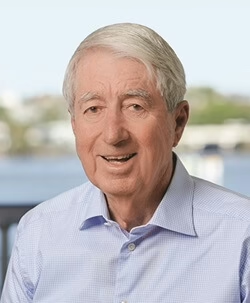
It was a pleasure to catch up with Noel Whittaker last week and hear his take on the trade-offs many retirees face. But first, we touched on the current market volatility and what it means for those about to leave full-time work. His sense is that most older Australians feel they’ve “seen it all before” and are prepared to ride out the storm. Still, he noted that our complex retirement income system makes decision-making tough, with plenty of ifs, buts and maybes along the way.
Noel is a strong believer that major retirement trade-offs shouldn’t arrive by surprise — and that means planning ahead.
“Retirement is a new phase of life — the better you prepare, the better it will be,” he says.
He also challenges the idea that working longer is a negative.
“It depends on your skills and occupation, but the most important thing is to have purpose and a social network. Work is just one way of fulfilling that need.”
He’s a big fan of Marta Zaraska’s Growing Young, which reinforces this view, describing loneliness as a poison. For Noel, sorting out the social side of retirement is every bit as important as sorting out the money.
But he’s also known as a voice of reason when it comes to practical financial decision-making — so we asked him to talk about the three most common trade-offs in retirement. He prefers the word ‘choice’ to ‘trade-off’ but agreed the following questions are some of the most important dilemmas many Australians will face at some point in their retirement journey.
1. Pay off the mortgage or contribute more to super at 65?
Noel is clear on this one. He encourages pre-retirees to keep making pre-tax (concessional) contributions to super, up to the $30,000 annual limit. With mortgage rates sitting around 5.5% and long-term super returns typically 7-9%, the numbers speak for themselves.
He also highlights that mortgage payments are made from after-tax dollars, whereas super contributions are made from pre-tax income — another big advantage.
And once you’ve retired, he doesn’t necessarily recommend withdrawing a lump sum from super to pay off the mortgage. It may be far smarter, he says, to simply withdraw enough each year to cover the interest and let the rest of the super balance continue to grow in a tax-free environment.
He also recommends having three years’ worth of planned expenses set aside in cash or term deposits for peace of mind.
2. Stay in accumulation or move to decumulation?
In most cases, Noel believes it makes sense to shift into an Account-Based Pension (ABP) once you retire.
Take Bill and Mary, for example. They have $500,000 in super and own their home outright. By moving their funds into an ABP, they can enjoy tax-free earnings and still retain the flexibility to withdraw lump sums as needed.
If their pension account builds up beyond what they require, they can always move the excess back into a new accumulation account — giving them ongoing control and tax-effective management of their retirement savings.
3. YOLO travel now or save for later life?
The ‘You Only Live Once’ mindset encourages many to travel while they’re still fit and active — especially after attending too many funerals in their 60s and 70s. But splurging early can leave you short later, particularly when user-pays aged care comes into the picture.
Noel’s advice? Try to do both. Work a little longer if you can.
“Think about someone aged 60 with $500,000 in super,” he says. “If they keep working for just five more years, that could grow to $800,000 — it’s money for nothing.”
He shared the story of a friend who travels to Europe every second year, funding it with handyman work in between. And he reminds people that the Age Pension remains a valuable safety net for those who fall within the income and asset limits.
And don’t forget inheritance
Many people overlook the possibility of receiving an inheritance — often from parents or older relatives — in their 60s or 70s.
Noel points out that while these windfalls can give your retirement finances a welcome boost, they should be managed carefully. It’s essential to consider how any extra assets fit within your broader income plan, especially when it comes to tax, super contributions, and Centrelink thresholds.
One more thing…
Noel also spoke about his love of ‘second-level’ social connections — those casual, everyday interactions outside your immediate circle.
“I greet everyone I see on the street, in cafés, wherever I am,” he says.
The other night, he struck up a chat with a young hospitality worker named Michael and praised his professionalism. Michael was chuffed — and later asked Noel to be his mentor. Noel agreed. A new friend, a new role, a new connection.
These everyday moments, Noel says, can be powerful tools for reducing isolation. Some people do it naturally; others have to work at it — but it makes a real difference.
Noel Whittaker is a leading financial commentator and author of many great guides, including Retirement Made Simple.

The devil’s in the detail
This is a general overview. Everyone’s retirement circumstances are different, and decisions should be tailored accordingly. This isn’t financial advice — just a framework for thinking through some of the key choices ahead.
Have you made any retirement trade-offs?
If so, how did you approach the decision making process?
Additional information and support
Here’s another take on retirement trade-offs
Support to decide whether to pay down your mortgage
Support to best understand super options at Preservation Age
Support to understand your most appropriate spending levels
This article is provided by Retirement Essentials Representative Number: 001260855. We are an authorised representative of SuperEd Pty Ltd ABN 88 118 480 907 AFSL #468859. This information is not intended as financial product advice, legal advice or taxation advice. It does not take into account your personal situation, goals or needs and you should assess your own financial situation, consider if the information is suitable for you and ensure you read the relevant Product Disclosure Statement (PDS) if you choose to make any changes to your financial situation. It is always advisable to consult a financial adviser before making financial decisions.






I’m no professor of economics however If a couple had $500,000 in super they would be far safer to have it in cash. The past does not predict the future, It is irresponsible preaching risky investments in today’s world.
Agree 100%. It also depends on the morality of the fund manager. Similar to those many retail managers exposed in the Hayne royal commission, then I especially agree with you.
How much will they earn on interest if there super is in cash? I doubt it will keep up with inflation, while most balanced superannuation accounts do in the LONG TERM.
Thanks for your comments, Vin, John and Rod — it’s clear this topic taps into some big questions about trust, risk, and how best to manage money in retirement.
Cash can absolutely feel like the safer option, especially when markets are volatile or you’ve had reason to question the system. At the same time, as Rod points out, inflation has a way of eating into returns over time — and that’s where a long-term, balanced approach may still appeal to some.
It’s a good reminder that there’s no perfect formula. What matters most is feeling confident and in control of your own plan — whatever mix of cash or investments that might include.
Really appreciate you all taking the time to share your views. It’s great to have these honest conversations.
Kind regards,
Amanda Hardy Lai – Retirement Essentials Team
I had too much income, so I “moved” some funds from my income account into a new accumulation account.
My Super Fund has now told me I CANNOT move funds back into my income account or into a new income account.
They did not tell me this when I applied to move out of income account.
Hi Allan,
Thanks for sharing your experience — that does sound frustrating, especially if it wasn’t clearly explained at the time. Just to clarify, it is generally possible to move funds from an income stream (like an Account-Based Pension) back into an accumulation account, and then later roll them back into a new income stream. However, some super funds may apply specific rules or restrictions around how and when this can happen, so it’s worth checking the details with them directly.
I don’t agree with not owning your home in retirement if you can. The peace of mind it gives knowing you own the place and not the Bank can’t be measured. Also, remember your home is not counted by Centrelink unlike money in Super.
Hi Lynn, thanks for your comments, and yes, financial peace of mind is immeasurable. However we are all very different in the way we seek such peace of mind and some will be quite comfortable to hold a mortgage if they feel there is a higher return to be had on that money invested elsewhere. And yes, to own a home in retirement is a real bonus, warmest, Kaye
I see Lynn saying your home is not counted when assessing you for a pension .. However I was advised IF you are using part of the house ( like rent out part ) then yes they assess you and want a valuation done on the property .. I feel this is wrong but am being told by Centrelink that when you rent part you get the whole thing in your assessment .
Love some clarification on that as I see them in 2 weeks … My claim was rejected as saying too much asset ..
Hi Len, Thanks for your comment — great that you’re checking ahead of your Centrelink meeting. You’re right to question it. Normally, your home isn’t counted as an asset, even if you rent part of it. Centrelink may assess a portion of the income you receive (not the full value of your home), unless it’s a large-scale rental setup. If they’re saying the whole home is being counted as an asset, it’s worth asking them to clarify exactly why. Best of luck with the appointment!
Great article.
Thank you. Only thing I’m not sure about is the line: Think about someone aged 60 with $500,000 in super,” he says. “If they keep working for just five more years, that could grow to $800,000 — it’s money for nothing.”
What about if they die early? – they’ve worked five years more for nothing. Guess it works both ways.
Maybe it could be more: if you love your work keep going – if not, life’s too short.
Thanks Chris for your comments and yes, there are no guarantees in this life – so no guarantees you will have time to enjoy your savings. But I do know Noel is a massive fan of people who love their work keeping on and continuing to contribute. It’s such a personal decision and one that doesn’t have to be all-in or all-out if you are able to go part-time, for instance? warmest, Kaye
Hi Everyone, My wife has retired from teaching @ 64. I am 66 self employed and love my work (self employed )…I am hoping to work till past 70. We are financially comfortable and enjoy a rewarding social life….I like to call my approach …The Rolling Stones Syndrome….Messrs Jagger Richard and Wood are all post 78 yet enjoy their work playing music….If you are able to continue to work and enjoy same keep going!